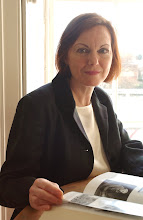
Coral Still sent me the death certificate of her ancestor, William Thorne, the paper hanger who fell off a ladder, broke his hip and died in University College London (see 'An untimely death at University College Hospital', 1 April 2009). It confirms that William sustained a comminuted fracture of the femur (thigh bone) and died from gangrene. A communited fracture is one where the bone is not cleanly broken but crushed or splintered in a number of pieces - almost impossible to repair in 1853, when he died.
However, what is intriguing about this death certificate is that a coroner was involved in investigating William's death. This was the coroner for Middlesex, who at that time was Thomas Wakley (portrait above). Wakley (who lived in Bedford Square, Bloomsbury) is famous for founding the Lancet journal, in 1823. This was the first inexpensive weekly medical journal, written specifically for the 'ordinary' British surgeons and physicians rather than the elite. It focused on 'hot' news and comment, especially the major political issues of the day, as well as learned medical articles. Wakley was a radical and spent much of the first decade of his editorship in the law courts, defending libel actions and copyright litigation. He pirated lectures delivered by eminent doctors and reprinted them in Lancet, and 'outed' those who had botched operations or misdiagnosed diseases.
Wakley became MP for Finsbury in 1835 as an independent radical reformer and his first parliamentary speech defended the Tolpuddle Martyrs, a group of Dorset labourers sentenced to transportation for forming an illegal trade union. He also campaigned agains the flogging of sailors as well as reform of the medical profession. It was largely Wakely's campaigning that resulted in the 1858 Medical Act, which created a Medical Register in which all practitioners were listed, and the establishment of a General Medical Council to regulate the profession and set clinical standards.
Wakely was elected Coroner for Middlesex in 1839, a role he adopted with his usual rigour, investigating every suspicious death in the district, calling multiple medical witnesses when he believed it necessary, and involving the police when he suspected foul play. He was particularly insistent that industrial accidents should fall under the coroners' jurisdiction, and his recommendations became the norm.
So, William Thorne's industrial accident came under Thomas Wakely's jurisdiction, a post-mortem would almost certainly have been ordered, and possibly an inquest held as well. We can guess that these events took place because William's death was registered over two months after he died. In any other district, it is unlikely that a coroner would have been involved at all.
